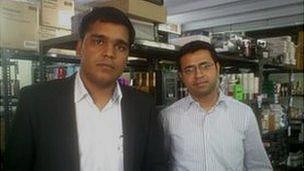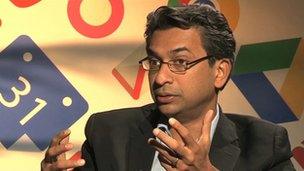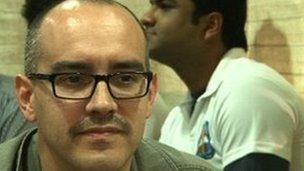The angels helping Indian start-ups spread their wings
- Published
Adrienne Murray reports on angel investors investing in Indian start-ups
Manish Taneja and Rahul Dash left their well-paid professional jobs in India's financial capital, Mumbai, because they wanted to start a business of their own.
They are among a growing tide of first-generation entrepreneurs in the country.
"Both of us were very interested in the internet space in India. We were looking for opportunities," says Mr Taneja.
That was 13 months ago, and they've since co-founded Purplle.com, a beauty and grooming website.
Mr Taneja adds: "We realised that beauty and grooming was at an inflexion point in India and we knew that it would take off."
Initially they used their own savings, before friends, family and former colleagues also came on board. Based at a tiny office and warehouse in the north of the city, they now employ 25 staff.

Purplle founders Manish Taneja and Rahul Dash have high hopes for the growth of their business
However, the pair have ambitious plans to grow their business, and increase orders tenfold over the next two to three years. So Manish and Rahul went to the group Mumbai Angels and pitched their business plan to a room containing 15 potential investors.
"Angel" investors are usually wealthy individuals, who typically invest between $25,000 (£16,000) and $1m in the early stages of enterprise.
One of the key elements is that the investor maintains a close relationship with the start-up and acts as a mentor. These "angels" are continuing to grow in number in India.
Advice and contacts
Myshaadi.in, a wedding planning website, secured financial backing from Indian Angel Network a year ago. Founder Abhishek Jain says the one of the invaluable benefits is the access they have given him to expert advice and a network of contacts.
"In the first year of our venture we realised that money is definitely important, but it's not the only factor," he says.
He adds: "You're out of college, [but] a company needs a lot of different skill sets to build it. You might be able to build a product sitting in a room, but building a company to run that product is a different story altogether."
First-time entrepreneurs often lack business experience, and without much collateral it can be difficult or expensive to get funds from traditional sources such as bank loans.
Avneet Makkar is a co-founder of the two-year old business CarveNiche Technologies, an educational software provider. She says raising money is the biggest problem the company has faced over the past year.
"Securing funding from banks is difficult because of the lack of knowledge of IT [that they have], and if you are able to get it, the interest rates are pretty high."
She adds: "When we go to banks, they do not even understand what an IT product is. They really only want to fund manufacturing units where they can physically see it."
Winning investment
Ms Makkar says there are too few angel investors, and not enough government help.

Google's Rajan Anandan is also an angel investor. He sees big opportunities for entrepreneurs in India.
For every start-up that succeeds in winning investment, there are many more that fail.
Just five years ago, there were only a couple of angel investor groups in India. Now several have been established, with a presence in most of the country's major cities.
Anil Joshi, president of Mumbai Angels, says it is becoming easier for start-ups to raise the capital they need, provided they have a good team and good idea. However, it is essential an entrepreneur does their homework before making a pitch.
"We look at [the] team, intellectual property, how big is the market, revenue model, and… any investment we make, we would like to see an exit from it," he says.
Risk and appetite
The head of Google's India operations, Rajan Anandan, is also an angel. He says he rarely bothers to read a business plan.
"I'd much rather look at a product, so if someone is approaching me I'd say, 'Well let's go to your site, let's look at your app, let's look at your software,'" he says.
It is a sentiment with which Dave McClure, often described as one of Silicon Valley's "super-angels", agrees.
Mr McClure is a former Facebook fbFund and Paypal employee, and a partner of the investment fund 500 Start-ups. He was recently touring Bangalore, Mumbai and Delhi, with Geeks on a Plane, an initiative that brings together start-ups and investors to explore opportunities in other markets.
He says: "We listen to ideas, but we look at products so what we like to see are functional prototypes that solve problems for customers - something they would be willing to pay for'.
Being an investor is not without risk either. Mr McClure reckons only one in five of the start-ups they invest in will be viable over the long-term.

Dave McClure, a "super-angel" from Silicon Valley sees huge opportunities in India
He adds: "The entrepreneur environment [in India] is changing fast because the customer environment is changing fast.
"There's huge adoption of mobile devices and tablets and I think that over the long-haul that's going to create a very big opportunity to deliver a bunch of products and services in commerce, in education, in small business services."
This also excites Mr Anandan. "We have an internet user market that's just crossed 150 million users, we have a mobile phone market... with 25 million smartphones.
"We'll end this year with more than 50 million smartphones. Video is exploding in India, we're the second biggest market for Facebook."
With India's start-up scene still in its infancy, this growing market can provide fertile ground for entrepreneurship.
Manish Taneja and Rahul Dash of Purplle.com say they are still in discussions with Mumbai Angels - and they believe they are close to securing an agreement which will provide them with the investment and support they want.
"I think it's still early days for start-ups in India, but it's extraordinarily interesting," says Mr Anandan.